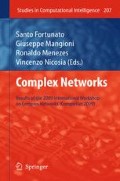Abstract
Commonly used techniques for the random generation of graphs such as those of Erdős & Rényi and Barabási & Albert have two disadvantages, namely their lack of bias with respect to history of the evolution of the graph, and their incapability to produce families of graphs with non-vanishing prescribed clustering coefficient. In this work we propose a model for the genesis of graphs that tackles these two issues. When translated into random generation procedures it generalizes the above mentioned procedures.When just seen as composition schemes for graphs they generalize the perfect elimination schemes of chordal graphs. The model iteratively adds so-called contexts that introduce an explicit dependency to the previous evolution of the graph. Thereby they reflect a historical bias during this evolution that goes beyond the simple degree constraint of preference edge attachment. Fixing certain simple statical quantities during the genesis leads to families of random graphs with a clustering coefficient that can be bounded away from zero.
Access this chapter
Tax calculation will be finalised at checkout
Purchases are for personal use only
Preview
Unable to display preview. Download preview PDF.
References
Arnborg, S.: Efficient algorithms for combinatorial problems on graphs with bounded decomposability – A survey. BIT 25, 2–23 (1985)
Barabási, A.-L., Albert, R.: Emergence of scaling in random networks. Science 286, 509–512 (1999)
Boccaletti, S., Latora, V., Moreno, Y., Chavez, M., Hwang, D.-U.: Complex networks: Structure and dynamics. Physics Reports 424(4-5), 175–308 (2006), http://cogimage.dsi.cnrs.fr/publications/2006/BLMCH06
Brandes, U., Gaertler, M., Wagner, D.: Engineering graph clustering: Models and experimental evaluation. ACM Journal of Experimental Algorithms 12 (2007)
da Fontoura Costa, L., Rodrigues, F.A., Travieso, G., Villas Boas, P.R.: Characterization of complex networks: A survey of measurements. Advances In Physics 56, 167 (2007)
Dorogovtsev, S., Mendes, J.: Evolution of Networks: From Biological Nets to the Internet and WWW. Oxford University Press, Oxford (2003), http://sweet.ua.pt/~f2358/
Erdős, P., Rényi, A.: On the evolution of random graphs. Madyar Tnd. Akad. Mat. Kut. Int. Kőzl 6, 17–61 (1960)
Guillaume, J.-L., Latapy, M.: Bipartite structure of all complex networks. Information Processing Letters 90(5), 215–221 (2004)
Gustedt, J., Schimit, P.: Numerical results for generalized attachment models for the genesis of graphs. Rapport technique, INRIA (2008), http://hal.inria.fr/inria-00349461/en/ RT-0361
Latapy, M.: Grands graphes de terrain – mesure et métrologie, analyse, modélisation, algorithmique. Habilitation à diriger des recherches, Université Pierre et Marie Curie, Paris, France (2007)
Mader, W.: Homomorphieeigenschaften und mittlere Kantendichte von Graphen. Math. Ann. 174, 265–268 (1967)
Nikoloski, Z., Deo, N., Kucera, L.: Degree-correlation of scale-free graphs. In: Felsner, S. (ed.) 2005 European Conference on Combinatorics, Graph Theory and Applications (EuroComb 2005), DMTCS Proceedings. Discrete Mathematics and Theoretical Computer Science, vol. AE, pp. 239–244 (2005), http://www.dmtcs.org/dmtcs-ojs/index.php/proceedings/article/view/dmAE0
Ravasz, E., Barabási, A.-L.: Hierarchical organization in complex networks. Phys. Rev. E 67(2), 026112 (2003)
Robertson, N., Seymour, P.: Graph minors II, algorithmic aspects of tree-width. J. Algorithms 7, 309–322 (1986)
Schank, T., Wagner, D.: Approximating clustering coefficient and transitivity. J. Graph Algorithms Appl. 9(2), 265–275 (2005)
Villas Boas, P.R., Rodrigues, F.A., Travieso, G., da Fontoura Costa, L.: Chain motifs: The tails and handles of complex networks. Physical Review E 77(2), 026106 (2008), http://link.aps.org/abstract/PRE/v77/e026106
Author information
Authors and Affiliations
Editor information
Editors and Affiliations
Rights and permissions
Copyright information
© 2009 Springer-Verlag Berlin Heidelberg
About this chapter
Cite this chapter
Gustedt, J. (2009). Generalized Attachment Models for the Genesis of Graphs with High Clustering Coefficient. In: Fortunato, S., Mangioni, G., Menezes, R., Nicosia, V. (eds) Complex Networks. Studies in Computational Intelligence, vol 207. Springer, Berlin, Heidelberg. https://doi.org/10.1007/978-3-642-01206-8_9
Download citation
DOI: https://doi.org/10.1007/978-3-642-01206-8_9
Publisher Name: Springer, Berlin, Heidelberg
Print ISBN: 978-3-642-01205-1
Online ISBN: 978-3-642-01206-8
eBook Packages: EngineeringEngineering (R0)

